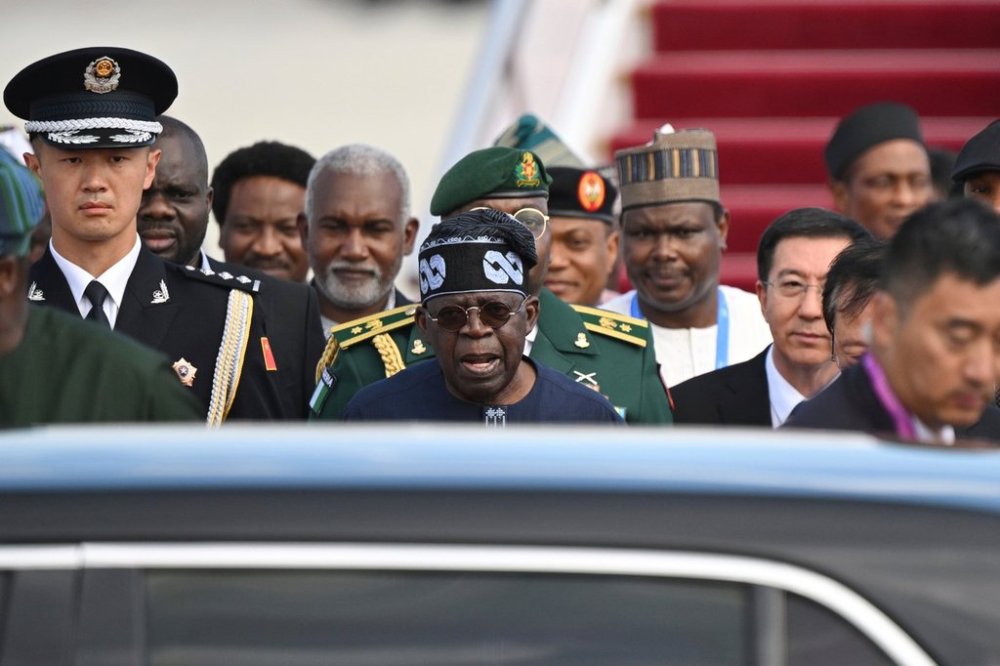What to know about abductions of schoolchildren in Nigeria
Advertisement
Read this article for free:
or
Already have an account? Log in here »
To continue reading, please subscribe:
Monthly Digital Subscription
$0 for the first 4 weeks*
- Enjoy unlimited reading on winnipegfreepress.com
- Read the E-Edition, our digital replica newspaper
- Access News Break, our award-winning app
- Play interactive puzzles
*No charge for 4 weeks then price increases to the regular rate of $19.00 plus GST every four weeks. Offer available to new and qualified returning subscribers only. Cancel any time.
Monthly Digital Subscription
$4.75/week*
- Enjoy unlimited reading on winnipegfreepress.com
- Read the E-Edition, our digital replica newspaper
- Access News Break, our award-winning app
- Play interactive puzzles
*Billed as $19 plus GST every four weeks. Cancel any time.
To continue reading, please subscribe:
Add Free Press access to your Brandon Sun subscription for only an additional
$1 for the first 4 weeks*
*Your next subscription payment will increase by $1.00 and you will be charged $16.99 plus GST for four weeks. After four weeks, your payment will increase to $23.99 plus GST every four weeks.
Read unlimited articles for free today:
or
Already have an account? Log in here »
ABUJA, Nigeria (AP) — Nigeria says more schoolchildren have been abducted in the country’s volatile north.
It’s not immediately clear who’s to blame in the latest seizure in Kebbi state, an act that has come to define insecurity in Africa’s most populous nation and the painful consequences. Kidnappers in the past have included the Boko Haram insurgency that carried out the mass abduction of 276 Chibok schoolgirls over a decade ago, bringing the extremist group to global attention. But groups of bandits are also active.
At least 1,500 students have been seized in the years since that Chibok attack. Here’s what’s to know about northern Nigeria’s widespread insecurity that affects children and adults — and Christians and Muslims — alike.

Boko Haram and an Islamic State affiliate
Boko Haram has long menaced large parts of Nigeria’s north, especially the northeast, as well as parts of neighboring Cameroon, Niger and Chad. The militant group has sought to impose an Islamic state in the region and its name – meaning “books are forbidden” – rejects Western education.
In 2014, Boko Haram burst onto the global stage with the Chibok abduction. Four years later, its fighters abducted 110 schoolgirls from a college in Yobe state in the northeast.
The militants have mounted a strong resurgence this year after splitting in the past, with many fighters now aligned with a local affiliate of the Islamic State. The exact number of fighters with each group is unknown, though they are estimated in the low thousands.
The groups continue to recruit, sometimes forcibly, youth who have been left vulnerable in a region that Nigerian authorities and humanitarian organizations struggle to serve safely. The Trump administration’s deep cuts in foreign aid to Nigeria this year haven’t helped.
Abductions for ransom
Other armed groups in northern Nigeria carry out abductions, largely for ransom. Authorities have said they include mostly former herders who took up arms against farming communities after clashes between them over increasingly strained resources.
Schools have been a popular target of the bandits, who are motivated more by money than religious beliefs. The attacks often occur at night, with gunmen at times zooming in on motorbikes or even dressed in military uniforms and then disappearing into the vast, under-policed landscape.
There is growing concern about links between the bandits and the militant groups, notably in the northwest.
“While often conflated with the militant Islamist groups, the bandits operating in northwestern Nigeria are a distinct driver of instability in this region,” the U.S.-backed Africa Center for Strategic Studies said earlier this year, noting that the bandits are thought to be responsible for about the same number of deaths there as Boko Haram and the IS affiliate are in the northeast.
In 2020, gunmen on motorcycles attacked a government secondary school in Katsina state and abducted more than 300 boys. The state government announced their release within the week. In 2021, gunmen abducted more than 300 schoolgirls in a nighttime raid on a government secondary boarding school in Zamfara state. Within weeks, all were released after the apparent payment of a ransom.
And in 2024, gunmen on motorcycles abducted 287 students at a government secondary school in Kaduna state.
Nigeria’s security challenges
Nigeria has struggled for years to combat Boko Haram and other armed groups, at times striking and killing civilians in mistaken air assaults meant for militants. The military also has carried out airstrikes and special operations targeting the hideouts of armed gangs.
But Islamic extremists in recent months have repeatedly overrun military outposts, mined roads with bombs and raided civilian communities despite the military’s claims of success against them. That surge in activity has strained security efforts across Nigeria’s north.
Last month, President Bola Tinubu replaced the country’s security chiefs.
Earlier this year, the U.S. government approved the sale of $346 million in arms to strengthen Nigeria’s fight against insurgencies and criminal groups. More recently, however, President Donald Trump has threatened Nigeria with potential military action — and a halt to all aid and assistance — while alleging that Nigeria’s government is failing to rein in the persecution of Christians. Nigeria has rejected the claim.

